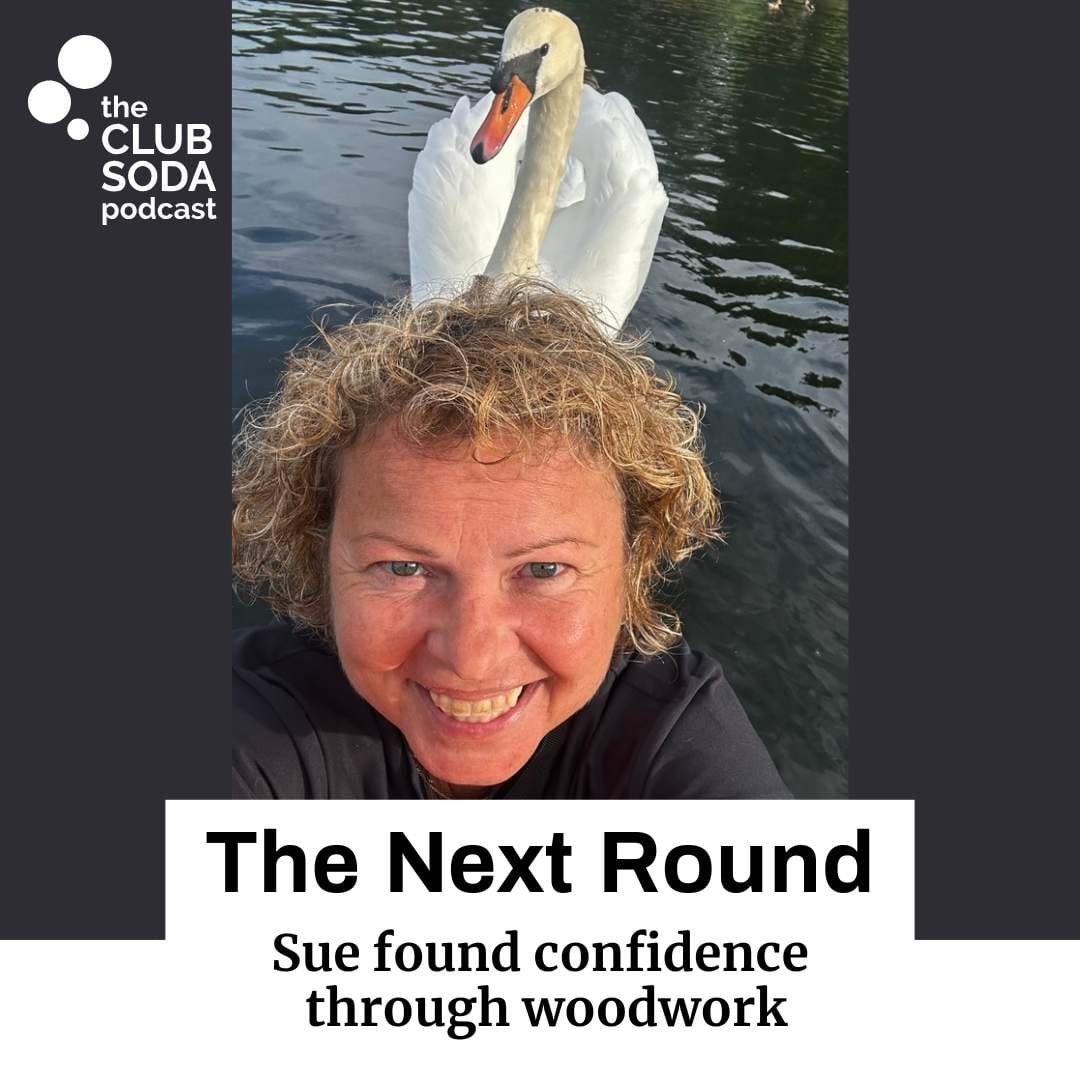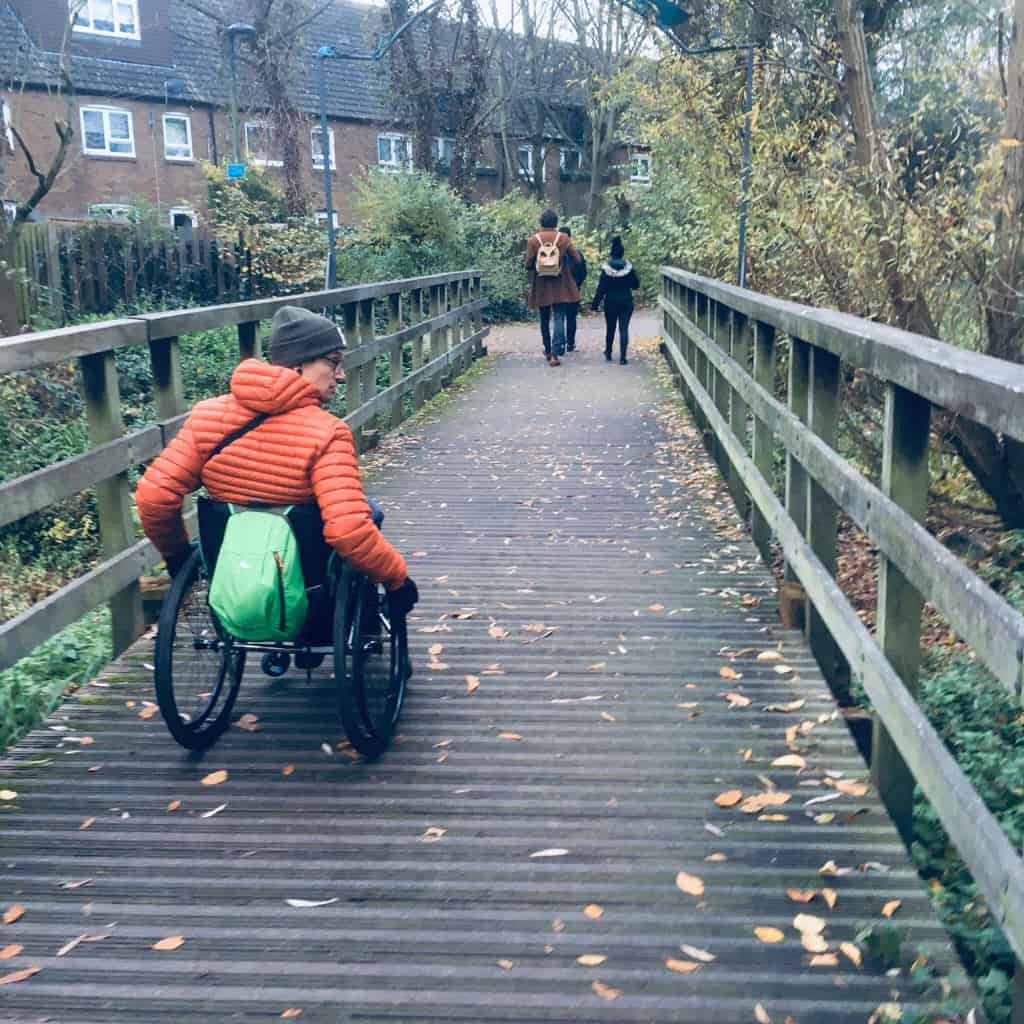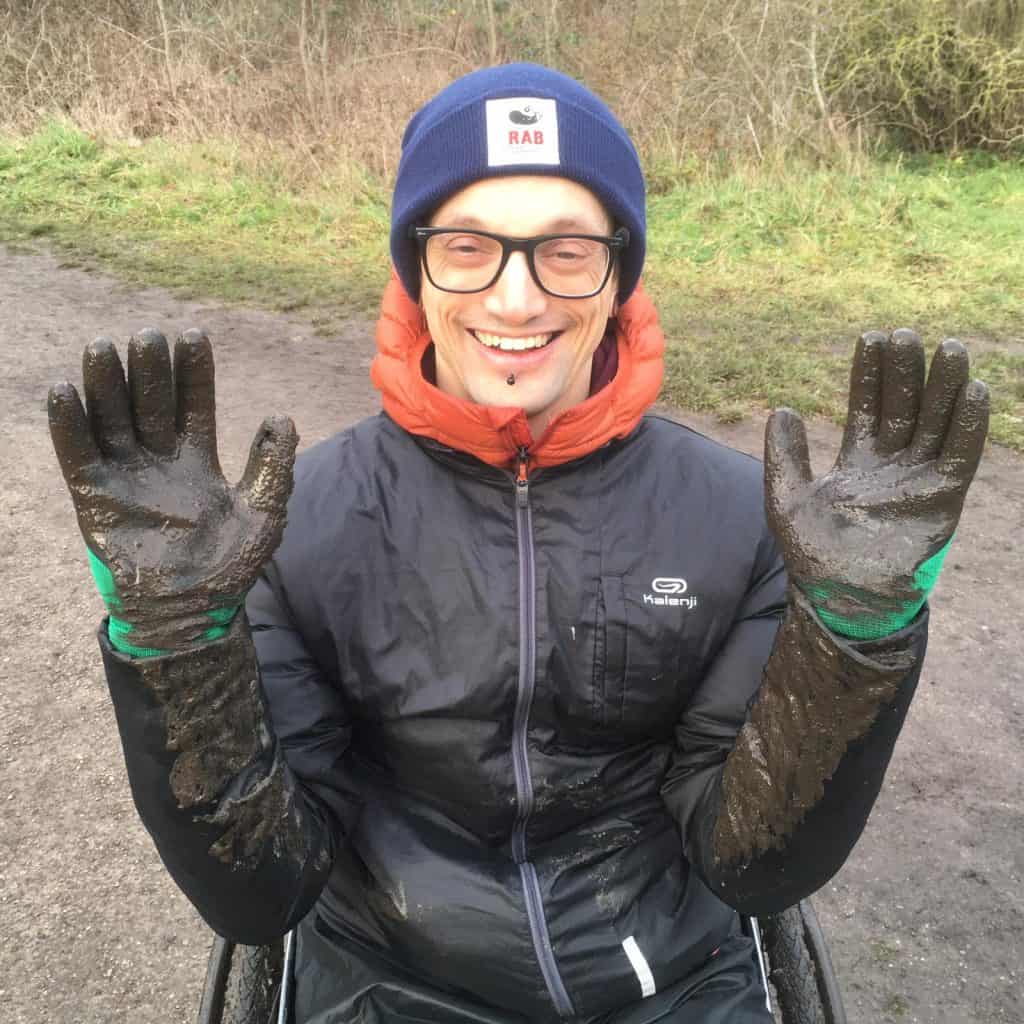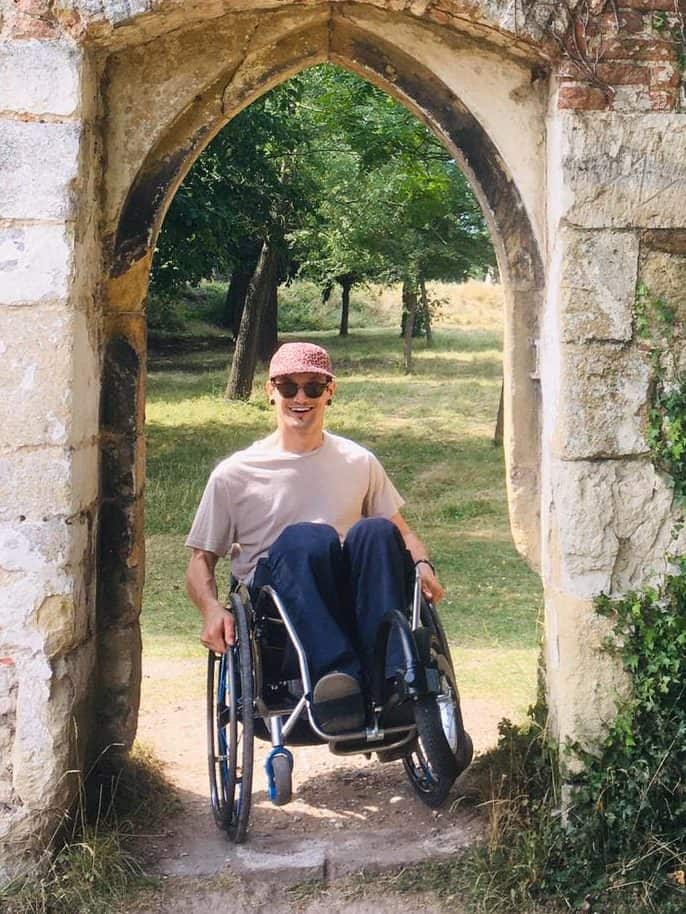
This website uses cookies to improve your experience. We'll assume you're ok with this, but you can opt-out if you wish. Read More
The Next Round: What happens after you change your drinking?

Some of us may have already met Dougal. He’s an active Club Soda member who, pre-pandemic, often attended events, supporting others throughout his sobriety journey. But what some of us may not have considered is the extra effort it takes Dougal to be an active member of the Club Soda community.
Disabled people and those with ‘hidden’ or chronic illnesses have a disproportionately higher prevalence of substance abuse and, as with every other aspect of their lives, need to put in extra effort and need additional support to find the right path to deal with alcohol and disability. Some with disabilities and hidden illnesses already battle with mental health issues, ableism, stigma, and practical issues such as accessibility. And therefore accessing help with problem drinking can feel like one hurdle too far for many.
But not for Dougal. His story of giving up alcohol and living with disability is one of reflection, determination, and how to write the best dating profile if you’re in a wheelchair.

Dougal, you’ve been sober for a few years now – tell us where your journey with alcohol and disability began.
Looking back, I only started drinking when I was 16 and wasn’t really a big drinker, but the second I turned 18 and I was able to drink, it became a problem immediately. Fundamentally, my disability led me down a path of addiction. I didn’t really like myself, I didn’t feel confident, I wore a knee-brace and looked different. That didn’t help my self-esteem and so alcohol was an easy way of coping with those feelings, however flawed a tactic.
I was born with a rare neurological condition called Congenital Autonomic Sensory Neuropathy with insensitivity to pain – it’s a sexy title. Basically, the further down my body you go, the less I can feel. Face? Fairly normal. Skin irritants? Not so much. When you get to my feet, I can’t feel broken bones. When I was 5 my parents noticed that something was wrong with my leg. I went to the hospital for a scan, and after some unusual results, the doctor squeezed my leg. It was broken, and not for the first time. Most 5-year-olds would have hit the ceiling and I didn’t react at all. This is when we realised that something was wrong, and I’ve spent a lifetime doing lots of day trips to hospitals where doctors poke and prod you and talk excitedly about what a weirdo you are!
Over time, though, the consequences of my disability became clear. Throughout my childhood, I did untold damage to my ankles and knees. At 14, which is a pretty formative time in everyone’s life, puberty had started a little later due to the neuropathy and my right leg didn’t grow – it’s 9cm shorter than my left leg. Looking back, that’s the point where things started to go wrong. Being a teenager, I didn’t deal with things well and my self-esteem was at an all-time low, and being told I would be in a wheelchair soon made this depressed, angry teenager defiant not to be put in a chair.
How did alcohol and disability affect your adult life?
I didn’t really think that my drinking was a big problem initially. My friends used to say “Oh that’s just Dougal, he’s that friend who drinks too much”. I also seemed to be able to drink large quantities and nobody would realise that I was drunk – it was bizarre.
When I was in my mid-twenties, I got into a new relationship and it was then that my drinking increasingly became a problem. I recognise that I wasn’t always fair in the relationship – I’d become secretive about drinking, and when my partner used to take me to task, I would deny it, undermining my partner’s trust in me. Essentially, that relationship ended because of my alcoholism.
In 2018, things hit a bit of a crescendo. My relationship had ended, I was sofa surfing, I’d spent all my savings on alcohol and my freelance career was super stressful. I house-sat for some friends for the weekend and spent the whole time drinking. I walked to the shop to get more booze. And then I cried all the way back to the house, thinking “What am I doing? I’m burning my life to the ground, and for what. All because of alcohol and disability?”
I wrote this list in the notes section of my phone:
I wrote a whole load of bullet points. It wasn’t a huge dramatic bucket list, it was just basic stuff like “I will not wake up and hate myself”. It’s a classic story, but it was an important turning point.
Suddenly there was a part of me that realised that this was quite deliberate self-harm, and for someone with limited pain sensation, drinking was physically hurting me – I drank through the pain I could feel that was of my own creation.
How did you address the realisation that alcohol and disability weren’t a good partnership for you?
Part of the reason that I started drinking too much was that although I have limited pain sensation, I do feel pain, and so trying to stand on my legs at the bar hurt like hell. I tried to be part of the gang of mates while putting myself through agony, and the only way to numb that was to drink. I’m 34 now and it’s only in the last couple of years that I’ve started to get to grips with all that trauma – dealing with being comfortable in my body as someone with a visible disability took a long time, and it’s only then that I could begin to unpick the unhealthy coping mechanisms of getting to that point.
There are also tons of disabilities that are not visible. We should always be wary of asking people why they don’t drink because we don’t know their stories. I don’t really know any wheelchair users that are sober – my instinct is that there are a ton of people with chronic illnesses and disabilities out there who are also using the crutch of alcohol and disability numbing. I can’t be the only person in this boat using the same coping mechanisms to deal with pain.
People sometimes underestimate how limiting and traumatic chronic illnesses and disabilities are on people.
As we’ve discussed, there’s not a huge amount of information or support out there about problem drinking and disability, something we’d like to help address. What is your experience of being someone with a visible disability in the sobriety world?

Being disabled, in my experience, puts an extra layer of life admin on pretty much everything. Whenever I’ve gone to events, most people have been really good at giving me information about what I’m able to do (especially Club Soda events). So not only are you going to a sobriety event that can be emotionally exposing, there’s also the extra step of emailing about access requirements and all the hassle of planning for the extra stuff that able-bodied people don’t have to consider. I wonder if it adds that extra barrier for going to sobriety events and meetups for disabled people, which is why I’ve been one of the few visibly disabled attendees at sober events recently? If you have a disability, you’re probably already feeling vulnerable but also having to add the extra complications and feel like being a pain in the ass, could be a step too far for some. I’m fairly self-confident about asking for what I need now, but if you’re not confident in your disability, then that can add tension and is an extra hurdle that shouldn’t be underestimated.
But honestly? Mine is a classic tale. I’ve had trauma, it’s caused me to use alcohol as a crutch, it became destructive and I’ve managed to stop for over two years. The thing I’ve found through my own experiences is the amount I enjoy life now. I can go out with colleagues for a drink and ask for an alcohol-free beer and they’ll say “Sure” – nobody cares! I’ve found more self-confidence and am happy in a new relationship.
There are still moments when you realise that you’re adding to the list of things that make you stand out. My dating profile would say “Sober vegetarian wheelchair user from Hackney”. I mean, who wouldn’t want those pros from dating me? I can see why sobriety seems like it could be another stumbling block to fitting in with others, but being sober has shown me that all I really need is to feel ok in myself.
Also, as a wheelchair user, another pro is that the parking is great and I can park closer to the shop! I didn’t put that on my dating profile.
This website uses cookies to improve your experience. We'll assume you're ok with this, but you can opt-out if you wish. Read More
| Name | Domain | Purpose | Expiry | Type |
|---|---|---|---|---|
| wpl_user_preference | joinclubsoda.com | WP GDPR Cookie Consent Preferences. | 1 year | HTTP |
| PHPSESSID | www.tickettailor.com | PHP generic session cookie. | 55 years | HTTP |
| AWSALB | www.tickettailor.com | Amazon Web Services Load Balancer cookie. | 7 days | HTTP |
| YSC | youtube.com | YouTube session cookie. | 55 years | HTTP |
| Name | Domain | Purpose | Expiry | Type |
|---|---|---|---|---|
| VISITOR_INFO1_LIVE | youtube.com | YouTube cookie. | 6 months | HTTP |
| Name | Domain | Purpose | Expiry | Type |
|---|---|---|---|---|
| _ga | joinclubsoda.com | Google Universal Analytics long-time unique user tracking identifier. | 2 years | HTTP |
| sbjs_migrations | joinclubsoda.com | Sourcebuster tracking cookie | 55 years | HTTP |
| sbjs_current_add | joinclubsoda.com | Sourcebuster tracking cookie | 55 years | HTTP |
| sbjs_first_add | joinclubsoda.com | Sourcebuster tracking cookie | 55 years | HTTP |
| sbjs_current | joinclubsoda.com | Sourcebuster tracking cookie | 55 years | HTTP |
| sbjs_first | joinclubsoda.com | Sourcebuster tracking cookie | 55 years | HTTP |
| sbjs_udata | joinclubsoda.com | Sourcebuster tracking cookie | 55 years | HTTP |
| sbjs_session | joinclubsoda.com | SourceBuster Tracking session | Session | HTTP |
| Name | Domain | Purpose | Expiry | Type |
|---|---|---|---|---|
| mailchimp_landing_site | joinclubsoda.com | Mailchimp functional cookie | 28 days | HTTP |
| __cf_bm | tickettailor.com | Generic CloudFlare functional cookie. | Session | HTTP |
| NID | google.com | Google unique id for preferences. | 6 months | HTTP |
| Name | Domain | Purpose | Expiry | Type |
|---|---|---|---|---|
| _ga_10XZMT03ZM | joinclubsoda.com | --- | 2 years | --- |
| AWSALBCORS | www.tickettailor.com | --- | 7 days | --- |
| cf_clearance | tickettailor.com | --- | 1 year | --- |
| VISITOR_PRIVACY_METADATA | youtube.com | --- | 6 months | --- |
Join Club Soda for 10% off your first order of drinks for UK delivery. Plus get our latest news and special offers for members to choose better drinks, change your drinking and connect with others.
If you get an error message with this form, you can also sign up at eepurl.com/dl5hPn